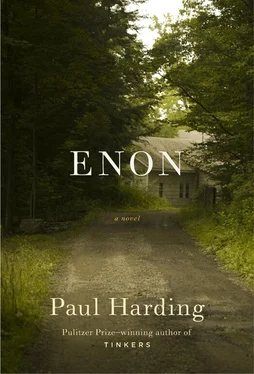“A blockhead,” I said. “A block of wood for a head.”
Now I dragged the vacuum cleaner out of the closet and plugged it in and turned it on and yanked the hose from the body and began to drag it back and forth across the top of the couch and the cushions. The white dust was so heavy and fine that the hose just made lines in the fabric.
“Attaboy; make it worse. Good show, old boy,” I said. I teased myself in the cheerful tone of voice I’d used when I was mad at myself but trying to contain my anger in front of Kate.
“Your daughter’s dead, old boy —you stupid shit,” I said. “And you are a wreck of a man with a block for a head.” I sighed and tipped over onto the couch and lay there with the metal vacuum cleaner wand across my chest, listening to the motor whine, feeling its revolutions through the wand. “A block of a head soaked in ether, a stump soaked in turpentine.”
The wind roared and buffeted the house, the vacuum motor whining harmony over it. Somewhere upstairs a storm window rattled in its frame. I felt as if I were spinning head over heels. At some point, I lost consciousness, with the vacuum still running and the storm rolling over Enon like a great, kingdom-sized turbine, tilling up its trees and hedges and fences, toppling tombstones and tearing shutters from their hinges and weather vanes off barn roofs, all while I dreamed my opium dreams.
I came to the next day at noon, already bolting dizzily off the couch, nearly stumbling over the books and bottles. The vacuum cleaner was still running from the night before and its canister burning hot to the touch. I switched it off and the sudden silence made me aware that the noise from its motor had been driving me mad in my sleep for hours. My ears rang in the quiet and it seemed as if I could still hear the vacuum the way that you still see the sun in front of you when you blink after you’ve turned away from it. A bitter, cooked smell wafted up out of the machine.
From what I could see outside the living room window, the yard was strewn with fallen branches and leaves and shingles from the roof. Something like the actual world began to resolve itself out of the oneiric morass in my skull and I made my way to the kitchen. I put on an old pair of sneakers that sat on top of a pile of old newspapers and mail and opened the back door and stuck my head out. The cupola from the garage roof lay splintered on its side in the yard. The trotting-horse weather vane that had been set on top of the cupola was speared upside down in the grass a few yards away. Four of the windows in the garage doors were broken. Glass and bricks and shingles and tree limbs were scattered across the driveway. I stepped outside and walked around the back of the house. Pillars of sunlight burst down from between the speeding clouds, swept across the landscape, and swung back up into their billowy bays. The wind ran smooth and strong behind the storm and smelled clean and sweet and invigorating, as if it were cleaning up in the hurricane’s wake and not the tail of the hurricane itself, or as if it were a signal that the hurricane trailed behind itself that said the violence was over and calm and safety and order were spreading back over the world. One of the maple trees had toppled and glanced off the back corner of the house, where Kate’s room was. I stepped back from the house into the yard to get a look at the roof. Half of the shingles had been blown off. A dozen bricks had broken loose from the top of the chimney, giving it the look of a crenellated castle tower. The yard smelled rich and earthy. Sparrows flew around and chirped and found food and grass and twigs to repair their nests with. The stark blue sky and the churning, retreating clouds and the cascading sun and the bright green grass and livid blond pith wood gleaming from the broken ends of fallen limbs and the wounds in the sides of the maple trees and the silvery-gray clear rainwater collected into a wide pool in the middle of the backyard corrugating in the wind were all overwhelmingly beautiful and I smiled at it all and sat down in the soaking muddy grass and wept.
THE HOUSE AND THE yard were such messes from my abuse and neglect and from the hurricane that I could not stand the idea of them remaining in that state while all of the other homes and yards of Enon were cleaned and repaired and brought back to their properly cared for conditions; nor could I bear the idea of following along in order not to be noticed and cleaning and repairing the house and yard myself. There was some irony in the fact that I felt certain I could not do the work because I actually knew how to do it and so I knew how much energy it would take, energy I knew I did not have anymore, in my condition. The idea that I neither could leave the house as it was nor fix it made me feel more hopeless than ever. On top of that, I imagined Kate standing at my side, surveying the damage, looking to me for resolve and optimism. Had she been alive, I’d have put my arm around her shoulder and squeezed her against me a couple times and said something like “Piece of cake, babe. We’ll have the farm up and running again in no time flat.” As it was, I sighed and said, “Ah, the hell with it, all of it.” I grabbed a backpack from the front hall and filled an old plastic soda bottle with tap water and started away from the house. When I was almost to the Red Orchard store, I took the backpack off and scratched around in the bottom to see if there was any money. I thought I might buy a pack of cigarettes or a candy bar if there was only a little change. I wanted to see how the store had weathered the hurricane and to say hi to Manny. I hadn’t been to the store in several weeks, maybe a couple months even — longer, in fact, I realized, not since I’d met Manny the first time, or talked with him anyway. I had a spontaneous hope of maybe helping him tape up a broken window and mop up the flooded floor and afterward sitting on milk crates and sipping cold colas and commiserating about all the work we’d accomplished. The store looked fine from the outside, so I stuck my head in the door to say hi and ask Manny how his kids were and to apologize for not having dropped in for a while, although in truth I was sure he couldn’t have cared less that I hadn’t been back in, and might have been glad for it, given the state I’d been in. There was a guy I didn’t recognize at the register, a tall kid with long hair and a bad slouch.
“Oh, hey,” I said.
“Hey,” the kid said.
“Sorry. Is Manny around?”
“Who?”
“Manny. The guy—” I almost said, with the kids . “His full name is Manprasad, I think. Works here every day.”
“Oh, that dude. He split.”
“Split?”
“Moved back to China or something. Couple months ago.”
“No kidding. Well, um, thanks.”
“No thing, man.”
Manny having moved back to India felt tragic, like the end of a sad movie, with me the guy walking away, dismayed and crushed as the credits roll. Damn, crummy little village, I thought. Crummy little footpaths and crummy little sanctuary. It’s all such a bunch of bullshit, and I’m its sorry-ass mascot. The Idiot of Enon. Fuck it.
I walked around for the rest of the day and late into the evening. It seemed I had no possible place left on this earth to go. I could not go back to the house. I did not want to spend the night in the wet, storm-tangled woods. A hotel was out of the question. I stopped walking and looked around. I was near the road across from Mrs. Hale’s estate, where I had spent summer nights stalking through her meadows with Peter Lord and my other friends, and where Kate and I had rested on our way home at dusk and watched the sun set and the beautiful, grand house settle into the dark, and where my grandfather and I had seen the amazing and for all purposes apocryphal orrery, with its ivory planets and moons and brass sun, and I had turned the wooden-handled crank and made the entire arrangement of spheres spin on their axes and around one another and the sun in perfect symphony.
Читать дальше












